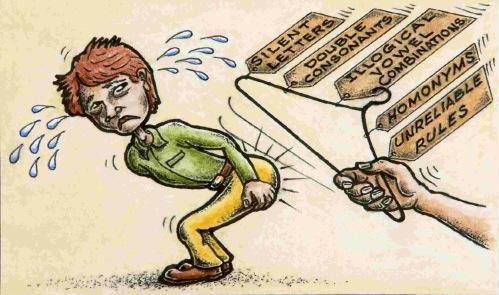This week on the BBC Radio show Fry’s English Delight, the topic was spelling. (You can listen to the episode until next Monday. Also, thanks to the Virtual Linguist for the heads up on her blog.)
We like to think of English spelling as absurd and unruly. But it wasn’t always this way: When it was first written down, English enjoyed an almost one-to-one letter-to-sound correspondence. But, as Fry outlines, English spelling received several layers of outside influence throughout history. The Norman French wanted English spelling to be a little more Frenchy (hence mice instead of mys), publishers thought the spellings of certain words should remind readers of their Holy Latin Origins (hence debt instead of det), and the Flemish typesetters were apparently homesick and thought English words should be spelled like Flemish words (hence ghost instead of gost). Some more fun examples can be found in this Mental Floss article.
Today, Fry says, “Our alphabet isn’t exactly fit for representing our language in writing.” He points inefficiencies, such as our 11 different ways of spelling the /e/ sound: hey, gauge, weigh, pay, staid, lei…
Inefficiencies notwithstanding, our alphabet isn’t so bad. After all, we seem to get along just fine. Some proponents of reform say that English’s wacky spelling slows learning, but it’s not the worst, by far—Japanese, anyone? As I’ve blogged about before, a complicated writing system might even be making us smarter.
Why do spelling reforms work sometimes but fail other times? I think there are two primary reasons: convention and identification.
John Hart, a 16th century spelling reformer, recognized that even though his proposed system was objectively better and easier to learn than current English spelling, it would seem more difficult to people who were already accustomed to English spelling. Why should they have to relearn everything? Moreover, people need to be able to read things that were written before the reform—so many people would have to learn both forms anyway.
The other main issue with spelling reform is that reformers propose that English spelling should correspond to pronunciation. But, as David Crystal says in the broadcast, “Any spelling reform system which tries to reflect pronunciation… which pronunciation do you use?” Crystal suggests that this very issue may point to the strength of current English spelling: that it works for the many different pronunciations that English has around the world. In other words, if a speaker doesn’t identify with the proposed reformed spelling system, they will reject it. An acceptable reform to the system of English spelling must appeal to all English speakers.
Spelling reform is certainly possible, and it’s happening right now. It’s just that a system-wide, overnight reform is unlikely. Instead, it goes nice and slow, championed by the democracy of English writers rather than any reforming body in particular. For example, the alternate spelling “nite” is popping up more and more—in my opinion, it’s only a matter of time before it’s accepted in more formal arenas.
For an overview of spelling reform in other languages, check out the Spelling reform Wikipedia article. The article on Simplified Chinese characters, an example of government effort to increase literacy through spelling reform, may be of particular interest.
For a systematized examination of the sense behind English spelling, check out English Isn’t Crazy, by Diana Hanbury King.
